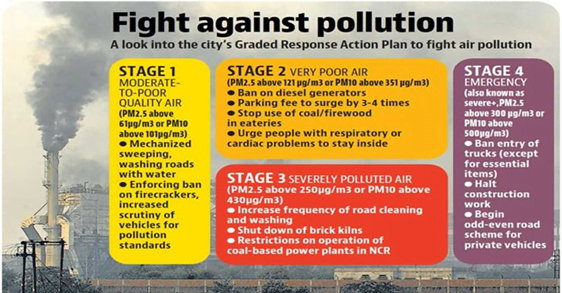Environment & Ecology, Governance
Context: Recently Commission for Air Quality Management in NCR and Adjoining Areas (CAQM) has revoked the Stage-3 of the Graded Response Action Plan in entire National Capital Region, NCR with immediate effect in view of the improvement in overall air quality.
About CAQM:
- Commission for Air Quality Management in National Capital Region (NCR) and Adjoining Areas (CAQM) was established by the CAQM Ordinance, 2020 and CAQM, Act 2021.
- The Act provides for the constitution of a Commission for better co-ordination, research, identification, and resolution of problems related to air quality in the National Capital Region (NCR) and adjoining areas.
- Adjoining areas have been defined as areas in the states of Haryana, Punjab, Rajasthan, and Uttar Pradesh adjoining the NCR where any source of pollution may cause adverse impact on air quality in the NCR.
- Apart from consolidating all agencies that monitored, investigated and planned mitigation of air pollution in the region, the commission has replaced the Supreme Court-appointed Environment Pollution (Prevention and Control) Authority (EPCA) which had been running for 22 years.
Powers of the CAQM:
- The rulings by the Commission on air pollution will override anything contained in any other law.
- The powers of the Commission will also supersede that of any other body in matters of air pollution.
- Therefore, in cases where conflict may arise between orders or directions issued by the other State governments, State Pollution Control Boards or even the Central Pollution Control Board, the orders of the Commission will prevail.
- The Commission will have the power to take measures, issue directions and entertain complaints “for the purpose of protecting and improving the quality of air in the National Capital Region”.
- It will also coordinate action taken by states on air pollution and will lay down parameters for air quality and emission or discharge of environmental pollutants.
- It will also have powers to restrict industries in any area, carry out random inspections of any premises including factories and be able to close down an industry or cut its power and water supply in case of non-compliance.
- It will also be monitoring the measures taken by the States to prevent stubble burning.
Comprehensive policy formulated by CAQM: Commission for Air Quality Management in NCR and adjoining areas (CAQM) recommended a uniform pricing policy for natural gas in the region pointing out that with the key commodity being outside the purview of the GST, State taxes are making it costlier. As per the policy
- All thermal power plants located within 300 kilometre radius of Delhi will have to ensure compliance with emission standards as per the deadline set by the Ministry of Environment and Forest.
- phasing out diesel-run auto-rickshaws in Gurugram, Faridabad, Gautam Buddha Nagar and Ghaziabad by December 31, 2024 and
- The remaining districts in the National Capital Region (NCR) by December 31, 2026.
- Only Compressed Natural Gas (CNG) and electric autos will be registered in NCR from January 1, 2023.
- Fuels pumps in Delhi-NCR will not give fuel to vehicles not having a valid pollution-under-check certificate from January 1, 2023.
- Tax structure to be rationalised for the NCR sub-regions till the time GST reforms are possible to make gas more competitive and enable its rapid adoption to replace coal and other dirty fuels in the region.
- State governments have been asked to implement a scrappage policy for end-of-life vehicles that cannot be used anymore.
- The use of coal in the industrial application will be banned from January 1, 2023.
- To prevent stubble burning, Punjab and Haryana will have to utilise 6 million tonnes and 2 million tonnes of paddy straw industrial applications, respectively as well as thermal power plants, biomass power and production of bio-fuels by December 31, 2026.
- The policy also stressed the need to upscale the application of bio-decomposer solution, which decomposes paddy straw.
- For effective traffic management, the policy mandates the development of early warning systems to inform commuters and plan route diversions in Delhi, Gurugram, Faridabad, Gautam Buddha Nagar and Ghaziabad districts.
- It also focuses on strengthening the quality of air pollution data and filling gaps through sensor-based monitoring to cover rural and peri-urban areas.
About Environment Pollution Control Authority (EPCA):
- EPCA was constituted with the objective of ‘protecting and improving’ the quality of the environment and ‘controlling environmental pollution’ in the National Capital Region. The EPCA also assists the apex court in various environment-related matters in the region.
- EPCA is Supreme Court mandated body tasked with taking various measures to tackle air pollution in the National Capital Region. It was notified in 1998 by Environment Ministry under Environment Protection Act, 1986.
About Graded Response Action Plan:

Source: NewsOnAir
Previous Year Questions
Q.1) In the Guidelines, statements: context of WHO consider the Air Quality following
- The 24-hour mean of PM2.5 should not exceed 15 ug/m³ and annual mean of PM 2.5 should not exceed 5 µg/m³.
- In a year, the highest levels of ozone pollution occur during the periods of inclement weather.
- PM10 can penetrate the lung barrier and enter the bloodstream.
- Excessive ozone in the air can trigger asthma.
Which of the statements given above are correct? (2022)
- 1, 3 and 4
- 1 and 4 only
- 2, 3 and 4
- 1 and 2 only
Q.2) “R2 Code of Practices” constitute a tool available for promoting the adoption of (2021)
- Environmentally responsible practices in the electronics recycling industry
- Ecological management of ‘’Wetlands of International Importance” under the Ramsar Convention
- Sustainable practices in the cultivation of agricultural crops in degraded lands
- ‘’Environmental Impact Assessment’’ in the exploitation of natural resources











